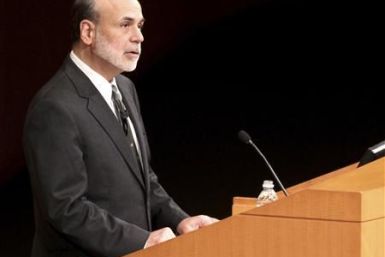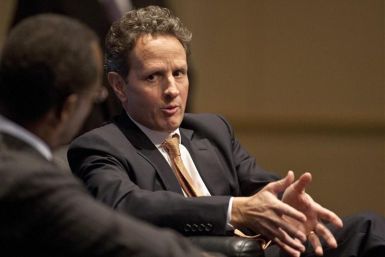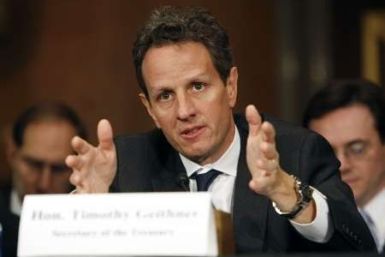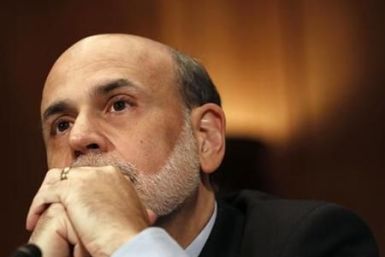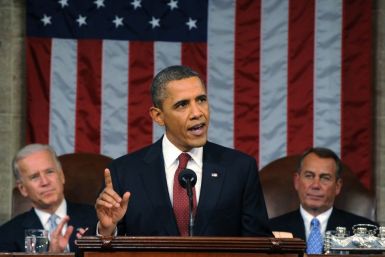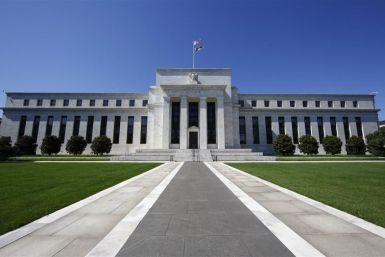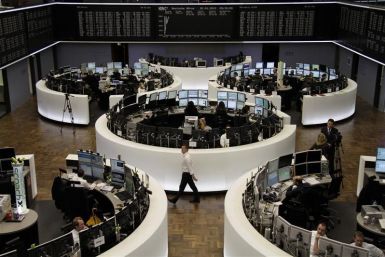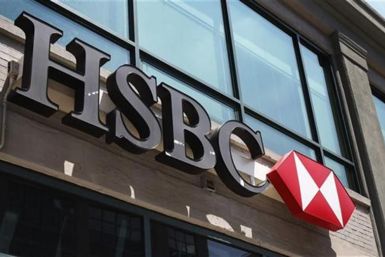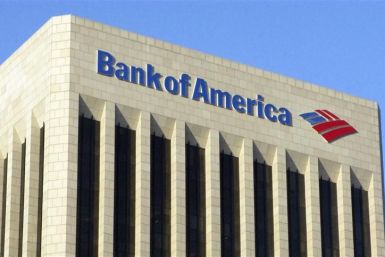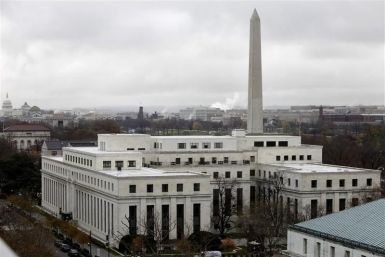Below are highlights from Federal Reserve Chairman Ben Bernanke's news conference following the Fed's policy meeting on Wednesday.
Federal Reserve Chairman Ben Bernanke said Wednesday the central bank was ready to offer the economy additional stimulus after it announced it would likely keep interest rates near zero until at least late 2014.
Treasury Secretary Timothy Geithner sought to calm fears that the Obama administration's bank reforms were hostile to the U.S. financial industry, saying on Wednesday the reforms were "tough where they need to be tough."
Stocks rose on Wednesday after the Federal Reserve said it would keep interest rates near zero through at least 2014 and Apple's spectacular results boosted investor sentiment.
Big profits from Apple and a promise from the Federal Reserve to keep rock-bottom rates for at least two more years powered the U.S. stock market higher on Wednesday.
Federal Reserve Chairman Ben Bernanke signaled on Wednesday the central bank may consider further monetary easing, after the central bank announced interest rates would remain near zero until late 2014.
Secretary of the Treasury Timothy Geithner said Wednesday he won’t serve in a second Obama Administration
because he doesn’t expect to be invited to continue.
Concluding a two day meeting, the Fed released it's plans for monetary policy through 2014 today. Fed plans to keep the interest rate near zero through 2014.
Gold rallied 2 percent on Wednesday, rising above $1,700 an ounce for the first time since mid-December after the U.S. Federal Reserve said it will likely not raise rates for longer than previously expected due to a sluggish economic recovery.
Following is the Federal Open Market Committee's statement on interest rate policy issued at the close of its meeting on Wednesday:
The Federal Reserve took the historic step on Wednesday of setting an inflation target, of 2 percent, a victory for Chairman Ben Bernanke that brings the Fed in line with many of the world's other major central banks.
The Federal Reserve on Wednesday pushed back the likely timing of an eventual interest rate hike until late 2014, much later than it had previously said, as it nurses a still-sluggish economic recovery.
President Barack Obama's proposal to allow millions of homeowners to reduce mortgage payments is the latest in a series of federal efforts to aid the housing market, but it faces a number of obstacles.
The Nasdaq rose on Wednesday, powered by a strong earnings report from Apple, while the Dow and S&P 500 turned higher after the Federal Reserve said it would keep interest rates near zero through at least 2014.
The U.S. Federal Reserve on Wednesday said it will not raise interest rates until at least late 2014, even later than investors expected, in an effort to support a sluggish economic recovery.
World stocks and the euro suffered on Wednesday as uncertainty about Greece's debt talks overshadowed strong economic data from Germany, blow-out earnings from Apple, and expectations that the Federal Reserve will push back the timing of an eventual rate hike.
HSBC Holdings PLC is under investigation by a U.S. Senate panel in a money-laundering inquiry, the latest step in a long-running U.S. effort to halt shadowy money flows through global banks, according to people familiar with the situation and a company securities filing.
The Federal Reserve looks set to keep monetary policy on hold on Wednesday, even as it releases forecasts expected to show interest rates will be near zero for at least two more years.
Gold prices struggled Wednesday to hold recent gains as the dollar rose and investors awaited results of the Federal Reserve's two-day meeting on interest rates.
A group of consumer advocates, academics and economists want to end too-big-to-fail banks, starting with Bank of America Corp.
European shares and the single currency held firm on Wednesday as investor focus switched to the broader economic outlook and some strong results from leading U.S. companies, and away from worries about the stalemate in Greek debt talks.
Asian shares rose on Wednesday, underpinned by strong earnings from U.S. technology giant Apple, stabilizing European money markets and falling eurozone debt yields, with investors shifting their focus from Europe to the U.S. Federal Reserve.










